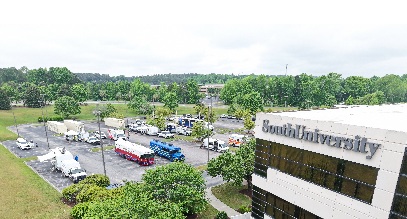 The South University Associate of Science in Allied Health Science degree is designed for students passionate about pursuing careers in healthcare.* The program offers a comprehensive education in general studies with a specialized focus on the sciences. As a student, you have the opportunity to learn principles from the natural, social, behavioral, and health sciences. You may also develop your communication skills, practice critical thinking, and examine subjects related to the prevention, diagnosis, and treatment of diseases and illnesses. In this post, we highlight seven major topics you’ll cover while earning your Allied Health Science degree at South University.
The South University Associate of Science in Allied Health Science degree is designed for students passionate about pursuing careers in healthcare.* The program offers a comprehensive education in general studies with a specialized focus on the sciences. As a student, you have the opportunity to learn principles from the natural, social, behavioral, and health sciences. You may also develop your communication skills, practice critical thinking, and examine subjects related to the prevention, diagnosis, and treatment of diseases and illnesses. In this post, we highlight seven major topics you’ll cover while earning your Allied Health Science degree at South University.
By completing your degree, you’ll be eligible to pursue work as a medical administrative assistant, work in medical records, or work in medical offices.
What Will You Study in Allied Health Science?
Medical Terminology
If you’re not familiar with it, the language of healthcare can sound like a bunch of gobbledygook. Hearing a bunch of terms you don't understand is overwhelming. If you want to work in healthcare, you need to learn the jargon. All students in our Allied Health Science program have the opportunity to learn how to read and comprehend terminology used in a variety of medical records and reports. You’ll focus on the definition, spelling, and pronunciation of medical terms relating to the human body. To help, our instructors teach the root words, prefixes, and suffixes common in healthcare.
Human Anatomy and Physiology
Knowing about human anatomy and physiology is essential for anyone working in healthcare. Knowing how the body is supposed to work will help you figure out and understand the things that can go wrong. In our Allied Health Science program, you’ll study the human body and how its many systems work separately and together. From atoms and molecules to cells and tissue, you’ll explore the tiny building blocks and chemical foundations of the body. You’ll also discuss how our body works to create a stable, balanced state that keeps us healthy. Your classes and lab work will cover:
- Skin and its layers (integumentary system)
- Muscles and bones (musculoskeletal system)
- The brain, spinal cord, and nerves (nervous system)
- Hormones and glands that control body functions (endocrine system)
- The heart and blood vessels (cardiovascular system)
- Defense systems against illness (lymphatic and immune systems)
- Lungs and breathing (respiratory system)
- The stomach and how food is broken down (digestive system)
- Kidneys and how the body eliminates waste (urinary system)
- Organs involved in reproduction (reproductive system)
You’ll also learn about the senses that rely on specialized organs (which include vision, hearing, balance, smell, and taste) and how they interact with the rest of the body’s systems. Together, classroom lessons and activities can give you a complete picture of how the body is put together and functions every day.
Human Pathophysiology
Human pathophysiology is the study of disease processes in humans. In your coursework, you’ll explore how and why diseases develop in the body. You have the opportunity to learn what causes different illnesses, how they affect the body, and what symptoms they create. You’ll also discuss how they’re diagnosed and treated. Lectures and class discussions will emphasize how various body systems and functions change when you are sick.
Nutrition
What we eat can affect how we feel and how healthy we are. As a healthcare worker, it’s valuable to know what nutritional practices are important as humans age and grow. In our program, you’ll find out how to promote optimum nutrition across the lifespan. You’ll also have the chance to evaluate controversies in the nutrition field and discuss how culture and factors like income, education, and occupation impact what people eat.
Microbiology
Microbiology is the study of tiny living things called microorganisms. Microorganisms are too small to see without a microscope. They include bacteria, viruses, fungi, and other microbes. Some of them can make us sick, while others play vital roles in our bodies, in nature, and in industries like food and medicine. As an Allied Health Science student, you’ll look closely at how microorganisms influence health, wellness, and disease.
Human Growth and Development
Humans change and grow in many ways throughout their lives, and healthcare workers see people at every point in their journeys. In this program, you’ll explore the stages of life from infancy through adulthood and aging. As you do, you’ll discover what’s normal physically, mentally, emotionally, and socially at each stage. Our instructors may also help you examine how things like family, culture, environment, and biology shape our development. Coursework will feature cross-cultural examples that illustrate both the similarities and differences in how people experience life. The goal is to understand not only how people grow, but why they grow and behave the way they do.
Laboratory Practices
The Allied Health Science program is designed to prepare you to pursue a variety of entry-level healthcare and medical office jobs.* While these positions may be largely administrative, knowledge of lab standards and processes is often useful. Through various lab courses in our program, you’ll have the opportunity to learn about essential lab practices, including equipment usage, proper specimen handling, disposal techniques, and universal precautions.
Get Started on Your Allied Health Science Degree
By educating you in the above areas, our Allied Health Science associate degree program could equip you to pursue your professional and educational goals in healthcare.* After completing an Associate of Science in Allied Health Science, you may also apply to a bachelor’s degree program in the field. Learn more today and request information to get started.
*South University does not promise or guarantee licensure, employment, or salary amounts.




